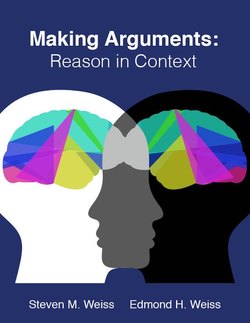Читать книгу Making Arguments: Reason in Context - Edmond H. Weiss - Страница 7
На сайте Литреса книга снята с продажи.
Why study argument?
ОглавлениеFor some, arguing is as natural as breathing. In fact, there is a type of person labeled “argumentative.” Often, the association with this label is negative, connoting a disagreeable person, a curmudgeon. Why would someone want to learn to be this type of person?
Although argumentativeness is a trait, and although having an argument can be psychologically uncomfortable, the values of arguing, and of being able to argue effectively, are well established. Success in argumentation translates into success in many aspects of life. Good arguers tend to have the following traits:
•Leadership
•Effectiveness in Writing and Speaking
•Ability to Think Critically
•Confidence
•Decisiveness
Learning to argue can lead to specific goals and special types of success. It is tied obviously to careers in law, politics, and journalism. Less obviously, arguing is associated with success in such fields as advertising, public relations, and religion. Virtually every scholarly and scientific profession has an argumentative community that serves as the judge for claims advanced in those fields—including the humanities, social science, and physical science. The professional guilds and organizations to which virtually everyone belongs have business meetings characterized by spirited debate and deliberation.
Teachers who argue well have a powerful pedagogical tool for working with their students. They also possess a skill that they can carry over into their instruction of students in speech, language arts, debate, and activities like model U.N.
Because argument is a communication skill, knowing how to use it has a synergistic benefit for other skills of communication as well. Good arguers tend to be good public speakers, debaters, writers, and proofreaders. Those who study argumentation learn to read critically and to make good policy analyses; they also acquire the ability to do sound research. Many debaters go on to law school, where their research skills are often valued as much as their skills of advocacy and public speaking.
Arguing can be enjoyable, an intellectual sport, akin to chess, or any other contest that involves strategy. Often though, the stakes in argument are more than a game, involving real issues in one’s community. Argument can help someone fight a parking ticket and has been known even to get a teacher to change a grade.
